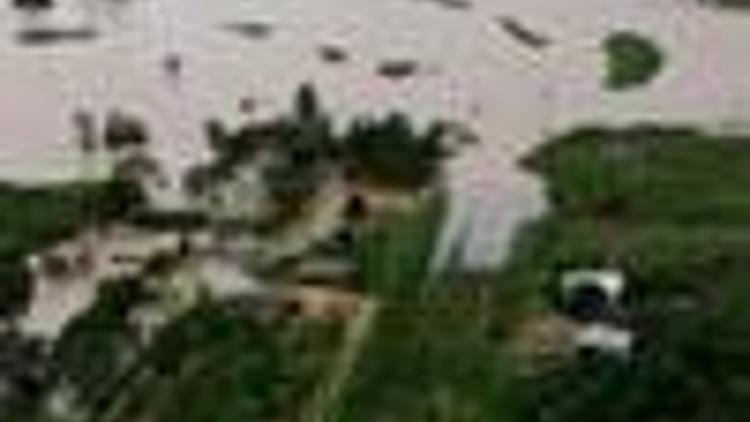Hurricane Ike closing in on Texas coast and Houston as 100,000s flee
Güncelleme Tarihi:

Hundreds of thousands of people fled coastal areas in the path of Hurricane Ike on Friday as the storm gathered strength on a collision course with the Texas Gulf Coast, threatening to swamp populous areas around Houston under a massive wave of water. (UPDATED)
Ike was a Category 2 storm with 105-mph (165-kph) winds and likely will come ashore late on Friday or early on Saturday as a potentially dangerous Category 3 storm on the five-step intensity scale with winds of more than 111 mph (178 kph), the U.S. National Hurricane Center said.
The storm menaced Houston, the fourth-most populous U.S. city and hub of the oil industry. Many remembered the chaotic highway evacuation of 2 million residents during Hurricane Rita in 2005, which ended up sparing the city.
Although the city could see hurricane-force winds, officials called for most residents to "shelter in place." "They are in a safer, better position if they stay where they are," Houston Mayor Bill White said.
Because of Ike's wide scope -- it is larger geographically than Hurricane Katrina was in 2005 -- it could bring a storm surge of up to 25 feet (7.6 meters), normally associated with larger storms.
The National Weather Service warned in a bulletin early on Friday of deadly flooding in some Gulf coastal communities during the period of peak storm tide.
"Persons not heeding evacuation orders in single-family one- or two-story homes may face certain death. Many residences of average construction directly on the coast will be destroyed," it said.
Ike was expected to produce heavy rains of up to 15 inches (38 cm) in some areas, the hurricane center said in its 5 a.m. EDT (0900 GMT) Friday advisory.
The storm arrives just 10 days after Hurricane Gustav forced 2 million people to flee the Louisiana coast and threatened a New Orleans still reeling from Katrina's devastation.
"The most important message I can send is, do not take this storm lightly," U.S. Homeland Security Secretary Michael Chertoff said in Washington. "This is not a storm to gamble with."
OIL PLATFORMS SPARED
With the storm's track taking it away from the bulk of 4,000 offshore platforms that produce about a quarter of U.S. oil supply, U.S. crude oil futures dipped as low as $100.10 a barrel on Thursday, the lowest level since early April.
Residents of Galveston -- an island city of 280,000 about 50 miles (80 km) south of Houston -- were ordered to evacuate, along with other low-lying counties. Some 600,000 people had left, the state said.
"We're getting up out of here," said Nykera Allen, a student who was loading up her car to drive to San Antonio in central Texas. "They're going to shut the lights and the water off and that's not a good situation."
The hurricane's current track would see it hit the Texas coast near Freeport in Brazoria County, just south of Galveston. It could be the worst storm to hit the Texas coast since Hurricane Carla came ashore near Corpus Christi in 1961.
The coastal areas under threat from Ike are lined with oil refineries that process about 25 percent of the nation's fuel. Some stretches boast resorts and million-dollar beachfront homes.
'A SURGE TSUNAMI'
New Orleans, where Katrina's storm surge flattened levees and flooded 80 percent of the city, appeared to be out of Ike's path, but is still under a tropical storm warning.
President George W. Bush declared an emergency exists in Louisiana due to the storm, ordering federal aid to help disaster relief in the state, the White House said.
While New Orleans is below sea level, downtown Houston is about 50 feet (15 meters) above, but the city's flat, expansive terrain still leaves it vulnerable to flooding.
One Texas official likened the potential wall of water to a tidal wave, not just a storm surge.
"This is a surge tsunami," said Jack Colley, of the state emergency management team. "This is not rising water."
In its latest advisory, the hurricane center said Ike was 365 miles (585 km) east-southeast of Corpus Christi and about 265 miles (425 km) southeast of Galveston. It was moving west-northwest at 13 mph (20 kph).
In Galveston -- site of a 1900 hurricane that was the deadliest weather disaster in U.S. history -- lines of cars, buses and trucks crowded onto a bridge to leave the island. Others without transportation waited for buses to carry them to shelters.
As always, hold-outs hunkered down to weather the storm. "I'm just going to batten down and not worry about it," said Keith Andrews, a shipyard worker. "If the Lord wants you, he's going to take you anyway."

